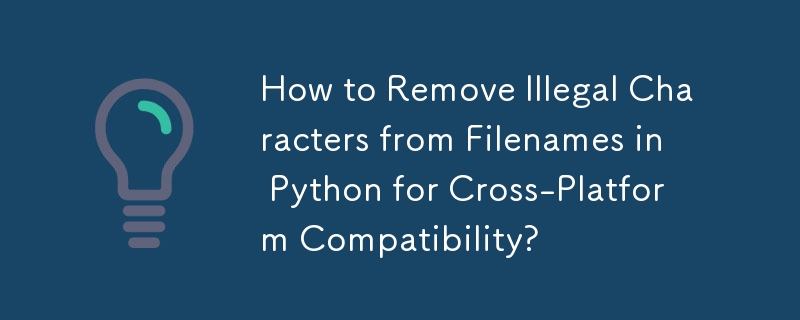 Backend Development
Backend Development
 Python Tutorial
Python Tutorial
 How to Remove Illegal Characters from Filenames in Python for Cross-Platform Compatibility?
How to Remove Illegal Characters from Filenames in Python for Cross-Platform Compatibility?
How to Remove Illegal Characters from Filenames in Python for Cross-Platform Compatibility?

Removing Illegal Characters from Filenames in Python
When using a string as a filename, it's essential to ensure that it only contains characters allowed by different operating systems. This means removing any symbols or characters that could cause conflicts or corruption.
For a comprehensive solution that adheres to strict criteria and supports filenames across Windows, Linux, and Mac OS, consider leveraging the functionality provided by the Django framework. Specifically, the slugify() function:
<code class="python">import unicodedata
import re
def slugify(value, allow_unicode=False):
# Normalize and convert to ASCII if necessary
if allow_unicode:
value = unicodedata.normalize('NFKC', value)
else:
value = unicodedata.normalize('NFKD', value).encode('ascii', 'ignore').decode('ascii')
# Filter out non-alphanumeric, underscore, or hyphen characters
value = re.sub(r'[^\w\s-]', '', value.lower())
# Replace spaces and consecutive hyphens with single hyphens
return re.sub(r'[-\s]+', '-', value).strip('-_')</code>This function effectively converts special characters to their ASCII equivalents, removes unwanted symbols, converts everything to lowercase, and replaces spaces and multiple dashes with single dashes. The resulting string is valid for use as a filename on multiple operating systems, ensuring seamless transfer and compatibility.
The above is the detailed content of How to Remove Illegal Characters from Filenames in Python for Cross-Platform Compatibility?. For more information, please follow other related articles on the PHP Chinese website!

Hot AI Tools

Undresser.AI Undress
AI-powered app for creating realistic nude photos

AI Clothes Remover
Online AI tool for removing clothes from photos.

Undress AI Tool
Undress images for free

Clothoff.io
AI clothes remover

AI Hentai Generator
Generate AI Hentai for free.

Hot Article

Hot Tools

Notepad++7.3.1
Easy-to-use and free code editor

SublimeText3 Chinese version
Chinese version, very easy to use

Zend Studio 13.0.1
Powerful PHP integrated development environment

Dreamweaver CS6
Visual web development tools

SublimeText3 Mac version
God-level code editing software (SublimeText3)

Hot Topics
 1379
1379
 52
52
 How to solve the permissions problem encountered when viewing Python version in Linux terminal?
Apr 01, 2025 pm 05:09 PM
How to solve the permissions problem encountered when viewing Python version in Linux terminal?
Apr 01, 2025 pm 05:09 PM
Solution to permission issues when viewing Python version in Linux terminal When you try to view Python version in Linux terminal, enter python...
 How to efficiently copy the entire column of one DataFrame into another DataFrame with different structures in Python?
Apr 01, 2025 pm 11:15 PM
How to efficiently copy the entire column of one DataFrame into another DataFrame with different structures in Python?
Apr 01, 2025 pm 11:15 PM
When using Python's pandas library, how to copy whole columns between two DataFrames with different structures is a common problem. Suppose we have two Dats...
 How to teach computer novice programming basics in project and problem-driven methods within 10 hours?
Apr 02, 2025 am 07:18 AM
How to teach computer novice programming basics in project and problem-driven methods within 10 hours?
Apr 02, 2025 am 07:18 AM
How to teach computer novice programming basics within 10 hours? If you only have 10 hours to teach computer novice some programming knowledge, what would you choose to teach...
 How to avoid being detected by the browser when using Fiddler Everywhere for man-in-the-middle reading?
Apr 02, 2025 am 07:15 AM
How to avoid being detected by the browser when using Fiddler Everywhere for man-in-the-middle reading?
Apr 02, 2025 am 07:15 AM
How to avoid being detected when using FiddlerEverywhere for man-in-the-middle readings When you use FiddlerEverywhere...
 What are regular expressions?
Mar 20, 2025 pm 06:25 PM
What are regular expressions?
Mar 20, 2025 pm 06:25 PM
Regular expressions are powerful tools for pattern matching and text manipulation in programming, enhancing efficiency in text processing across various applications.
 How does Uvicorn continuously listen for HTTP requests without serving_forever()?
Apr 01, 2025 pm 10:51 PM
How does Uvicorn continuously listen for HTTP requests without serving_forever()?
Apr 01, 2025 pm 10:51 PM
How does Uvicorn continuously listen for HTTP requests? Uvicorn is a lightweight web server based on ASGI. One of its core functions is to listen for HTTP requests and proceed...
 What are some popular Python libraries and their uses?
Mar 21, 2025 pm 06:46 PM
What are some popular Python libraries and their uses?
Mar 21, 2025 pm 06:46 PM
The article discusses popular Python libraries like NumPy, Pandas, Matplotlib, Scikit-learn, TensorFlow, Django, Flask, and Requests, detailing their uses in scientific computing, data analysis, visualization, machine learning, web development, and H
 How to dynamically create an object through a string and call its methods in Python?
Apr 01, 2025 pm 11:18 PM
How to dynamically create an object through a string and call its methods in Python?
Apr 01, 2025 pm 11:18 PM
In Python, how to dynamically create an object through a string and call its methods? This is a common programming requirement, especially if it needs to be configured or run...



